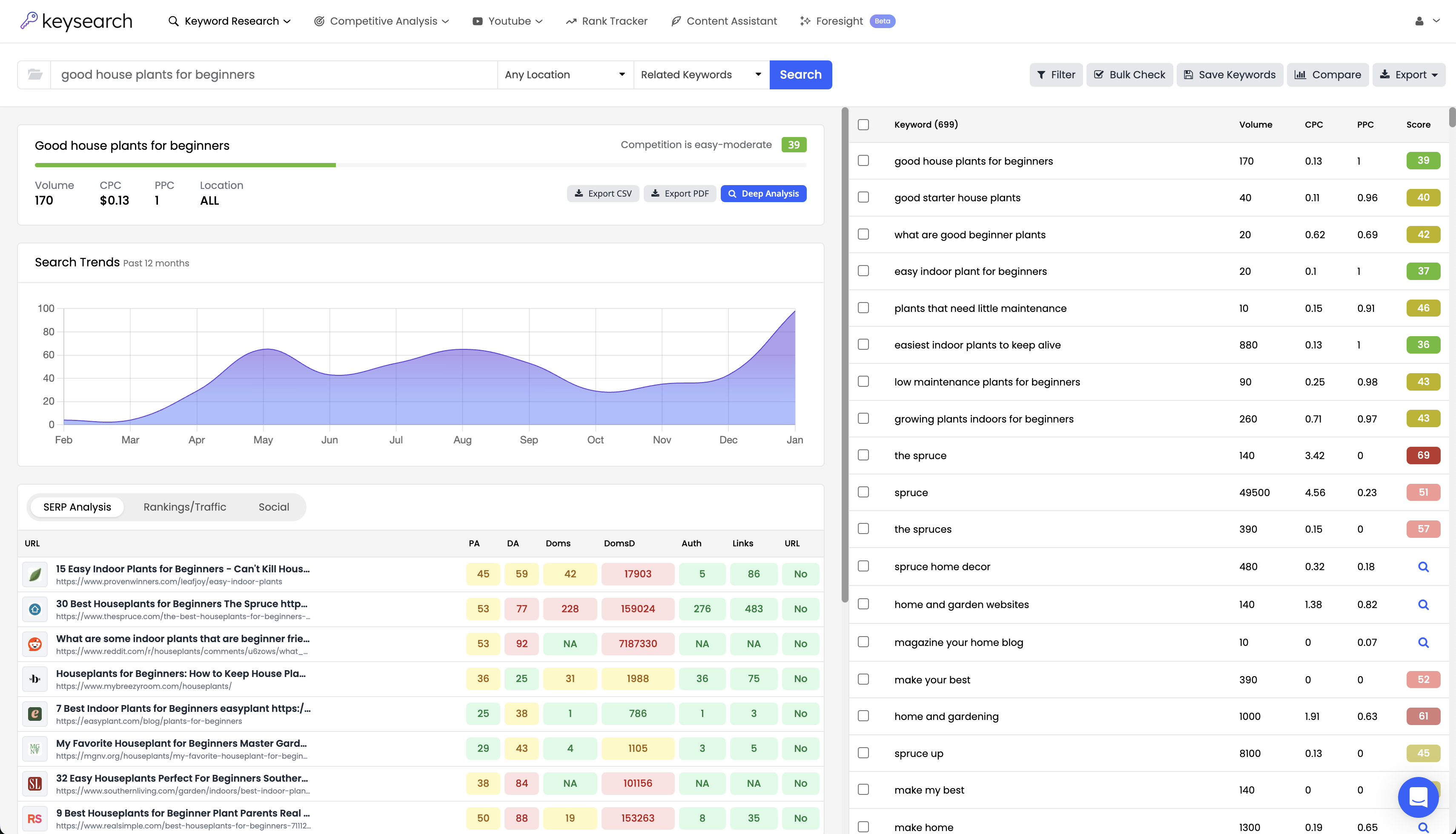You know you want to start a business – be it for affiliate marketing, Amazon FBA, or even your own blog. The question is, what should you focus on?
Finding a profitable niche can be a long-winded process, but it’s essential that you’re starting out on the right foot. Otherwise, you’ll dedicate countless resources and time towards an endeavor that never bears fruit.
Don’t worry, we’ll walk you through how to find a profitable niche in 4 different ways below. These include using your own life as inspiration, looking at common marketplaces, leveraging Google Trends, or better yet, using our intuitive niche finder.
Here at Keysearch, you gain access to all the free SEO tools you need to hit the ground running and plan out an effective keyword strategy for your business.
From helping you uncover goldmine opportunities to finding low-hanging fruit you can capitalize on, set yourself up for success with the most comprehensive suite of tools online!
What Exactly is a Niche and Why is Finding One So Important?
If you’re just getting started with online business you might not be aware of what exactly a niche is and why zeroing in on a very specific segment of the market is so important.
Broader markets are loaded with competition and you’ll struggle to stand out going up against bigger players. But, a well-defined niche allows you to connect deeply with your target audience, providing tailored solutions that resonate directly with them.
Finding the right niche defines the foundation of your entire business strategy. It influences everything from the products you offer to the content you create and the marketing strategies you employ. Your efforts would be too scattered without a clear niche, leading to wasted resources and missed opportunities.
The goal is to be a big fish in a small pond – not the other way around. This will allow you to eventually become known as an authority in that specific area. This builds trust and loyalty. Your audience is more likely to choose your products or services over a more general competitor.
You may have been led to believe that online business as a whole is too saturated in 2024 – and we’ll admit that it’s definitely not as easy as it was a decade ago. But the digital realm is still bustling with opportunities! You just need to know where to look.
How to Find a Profitable Niche: 4 Easy Ways to Uncover Goldmines
Finding profitable niches can take you less than 30 seconds using our intuitive tool here at Keysearch, which is the best way to go if you have no idea where to start or simply want to validate an opportunity you thought of.
That being said, we want to show you how to find a profitable niche in a few other ways as well, starting with using your own day-to-day life as inspiration.
Use Your Own Personal Life as a Starting Point
Your personal interests, hobbies, and experiences can be a goldmine of niche opportunities. Chances are there are a few things you’re already passionate about, so why not consider those as your business venture?
Whether it’s a hobby like photography, a lifestyle choice like veganism, or a professional skill like graphic design, your personal life can guide you toward a niche that you’re both passionate about and well-equipped to serve.
But even the things you do on a daily basis that you might not even think about can be a niche idea. There are niches all around you right now – and you’ll come across many more by the end of the day.
One of the best ways we’ve seen people come up with profitable niches is by writing down everything they see or touch for an entire day. You’d be surprised how many niche opportunities you discover!
Try Google Trends to Find Rising Potential
While your day-to-day life is a solid jumping-off point, it doesn’t really give you an idea of just how popular – or profitable, for that matter – a niche is.
The good news is you can use Google Trends to uncover emerging opportunities or find diamonds in the rough that others may have glossed over. You can enter broad keywords related to your areas of interest and see how their popularity has changed over time.
Look for topics with a steady upward trend, as these are more likely to continue growing. You can also compare multiple keywords to see which one is gaining more traction.
Look at Online Marketplaces Like Amazon, eBay, or Etsy
Online marketplaces like Amazon, eBay, and Etsy are treasure troves of data that you can filter through. If you see a lot of people selling something, chances are, it’s fairly profitable!
These platforms provide insight into what products are currently popular, what consumers are searching for, and where there might be gaps in the market.
Start by browsing categories that interest you and take note of best-sellers, product reviews, and customer feedback. Pay attention to items that have a high demand but limited competition, as these represent opportunities to carve out a niche.
The Best Way to Find a Profitable Niche: Our Tool at Keysearch
The best way to find a profitable niche is by using our tool here at Keysearch. It pulls inspiration from a wide variety of data sources, like Google or even platform-specific search data on Pinterest, YouTube, Etsy, or anything in between.
Whether you’re looking to start a blog, launch an e-commerce store, or offer a new service, Keysearch simplifies the process by highlighting niches with high demand and low competition. Simply enter an idea into the tool and you’ll be greeted by a list of opportunities on Google, Yahoo, Bing, and YouTube. You can then use our other tools to gauge the profitability feasibility of the niche, like our keyword difficulty tool.
Or if you want to find opportunities on a specific platform, use our free YouTube keyword tool, Pinterest keyword research tool, Amazon keyword research tool, or Etsy keyword research tool.
You can also see the most popular and trending niche ideas list for Twitter Trends, Amazon Movers, and Google Trends right on our website, further streamlining your niche research process.
Our comprehensive suite of tools here at Keysearch is relied on by more than 10,000 individuals. They’re all free to start with, too, and once you scale up you can choose from our very affordable plans. See all the other tools you gain access to below:
- Keyword density tool
- LSI keyword tool
- Robots txt generator
- SERP simulator
- Long tail keyword generator free
- Duplicate content checker tool
- Keyword grouping tool
- And many, many more!
Finding the top keywords for your niche has never been easier. Take the first step towards starting your business today by finding the most profitable niche possible!
What are the Most Profitable Niches?
Hopefully, these tips on how to find a profitable niche help you uncover an opportunity that not only is bursting with potential but also resonates with your own interests. But if you’re looking for a jumping-off point, here are some of the most profitable niches you can explore further:
- Health and Wellness: This encompasses fitness and nutrition, mental health, and holistic healing. An increasing focus on personal well-being means there’s a constant demand for products, services, and content that help people lead healthier lives. Sub-niches like weight loss, yoga, and dietary supplements are especially lucrative.
- Personal Finance and Investment: People are always looking for ways to manage their money better, invest wisely, and secure their financial future. Niches like cryptocurrency, stock trading, and budgeting advice offer significant opportunities for those with expertise in finance.
- Technology and Gadgets: There’s a never-ending interest in the latest gadgets, software, and tech innovations, especially given the evolution we’re seeing in tech. From reviews and tutorials to tech support and product recommendations, this niche attracts a tech-savvy audience willing to spend on the latest advancements.
- Personal Development: This niche includes areas like productivity, motivation, leadership, and mindset. People are constantly seeking ways to enhance their personal and professional lives. Content, courses, and coaching services in this niche perform exceptionally well.
- Relationships and Dating: Whether it’s advice on finding a partner, improving relationships, or navigating the complexities of modern dating, this niche will always be in demand. It focuses on products and services that help people connect, communicate, and strengthen relationships.
- Home and Lifestyle: Features interior design and DIY projects to gardening and sustainable living. With a focus on aesthetics and functionality, there are numerous opportunities for affiliate marketing, product sales, and content creation.
- Travel and Adventure: The travel industry experienced a setback during the pandemic but its rebound has been strong. People are eager to explore new destinations and experiences, creating an opportunity for travel guides, gear reviews, and adventure tourism.
- Pet Care: People always want to provide the best for their furry friends, making this niche highly profitable. From pet food and grooming products to training advice and pet services, this customer base is loyal and passionate.
- Beauty and Fashion: These evergreen niches aren’t going anywhere. Consumers constantly want the latest trends, products, and advice. There are ample opportunities for affiliate marketing, product launches, and brand collaborations through Instagram and YouTube.
- Online Education: The online education niche has exploded in popularity, with some saying it could replace traditional university programs. Courses and tutorials on a wide range of subjects – from coding to cooking – can be a goldmine for you to create a personal brand around.
These are just a few examples you can explore further, but remember – the more profitable a niche, the more competition you’ll face. Before you do anything else, you need to know how to find out if a niche is profitable.
Validating the Profitability and Feasibility of Your Chosen Niche
So you’ve got a great niche in mind – but is it profitable? More importantly, is it feasible for you to actually compete with the current brands or bloggers in that space?
You don’t want to dedicate any resources or additional time to a venture before validating it as a worthy opportunity. So, here are some tips to make sure it’s a practical pursuit.
Assess Market Demand
Use tools like Google Keyword Planner, Keysearch, and Google Trends to analyze search volume for relevant keywords and make sure there is actual demand for your niche.
You can also explore social media platforms, forums, and online communities to gauge the level of engagement and discussions surrounding your niche. Active conversations, groups, and a growing community are all good signs that the niche is in demand.
Just be aware that with increased demand comes increased competition. So, take a moment to look at who is currently dominating the space.
Analyze Competitor Presence
While it sounds counterintuitive, you do want to see some level of competition for the niche. A 100% untapped market means you’re taking on quite a bit of risk not knowing how viable the opportunity is. Chances are, there’s a reason nobody else has explored the space.
That being said, a niche with too many established players might be difficult to penetrate as a newcomer. Analyze competitors’ websites, content, and customer reviews to understand what they’re doing right and where they’re falling short.
Tools like SEMrush or Ahrefs can help you assess competitors’ traffic, backlinks, and keyword rankings. Look for gaps in the market that you can fill – perhaps by offering a unique product, better customer service, or more comprehensive content.
Calculate Potential Profit Margins
As far as how to find out if a niche is profitable, you can start by considering how you’ll monetize your audience. Are you creating an Amazon storefront or a blog that you intend to run affiliate offers to? Do you want to create digital information products?
There are so many ways you can monetize your audience, pick one to start with so you don’t spread yourself too thin. Look at what competitors are doing from a pricing perspective to get a better sense of the revenue potential.
Then, start factoring in expenses – for physical products that means accounting for manufacturing, shipping, and overhead costs. For digital products, add up the time and resources required to create and maintain them.
Test the Market
One of the worst things you can do is order 1,000 products in your first batch, or spend 100 hours creating an info product – only to find out the market isn’t interested.
So, start by running small-scale tests to validate your niche’s feasibility. You can create a minimum viable product (MVP) or a simple landing page to gauge interest. Use paid advertising, such as Google Ads or social media ads, to drive traffic and measure the response.
If your test yields positive results – such as sign-ups, pre-orders, or high engagement – you have a strong indication that your niche is worth pursuing.
Throughout the entire process of finding a profitable niche you want to be calculated to ensure you’re not wasting time and efforts, so don’t overlook this testing stage.
Now What?
So you’ve found a profitable niche that you deem to be a good opportunity – where do you go from here? It all depends on your specific business idea, whether you came here to learn how to find a profitable niche for affiliate marketing, dropshipping, or anything in between.
But, across all these ventures, developing a strong content strategy is an excellent starting point.
Develop a Content Strategy
Focus on creating high-quality, valuable content that addresses specific pain points within your niche. This not only helps you attract organic traffic but also establishes your authority in the niche, slowly but surely building trust in the market.
Use a mix of blog posts, videos, social media content, and other formats to engage your audience. If you aren’t sure where to start, use our keyword research checklist or learn how to automate keyword research. We have guides for specific platforms, too:
- How to do Pinterest keyword research
- How to do Amazon keyword research
- How to do Etsy keyword research
- How to do keyword research for Youtube
Optimize Your Website for SEO
Knowing what to do after keyword research is also important, as this is how you actually put your keyword research efforts into practice.
Use the niche keywords you identified during your research to optimize your website’s pages, including titles, meta descriptions, headers, and content.
You should also focus on off-page SEO, building backlinks from reputable sites within your niche to boost your website’s authority and search engine rankings.
If you’re running a business on Amazon, Pinterest, Etsy, eBay, or some other site that isn’t your own, you’ll still have the ability to conduct SEO. Just be sure to follow platform best practices.
Launch Targeted Marketing Campaigns
SEO is a slow burn, but it’s the best way to build a sustainable business. In the meantime, you can launch targeted marketing campaigns to start driving traffic and generating sales now.
Use a combination of paid advertising, such as Google Ads and social media ads. You can also explore influencer marketing. Across all channels make sure you tailor your messaging to highlight the unique value your products or services bring to your niche.
Monitor and Adapt
Make sure you’re tracking your success with keyword tracking, a feature included in Keysearch. You should also have Google Analytics setup to continuously monitor traffic, conversion rates, and other KPIs.
Be ready to adapt your strategies based on the data you collect, ensuring that you stay aligned with your niche market’s needs and trends. But at this point, the only thing left to do is get to work now that you know how to find a profitable niche and how to capitalize on it!
Closing Thoughts on How to Find a Profitable Niche
That concludes our guide on how to find out if a niche is profitable. This is the cornerstone of building a successful business, and you can’t afford to get it wrong. Otherwise, you’ll dedicate countless resources only to end up spinning your tires.
You can find additional resources in our blog like how to check keyword density, what is a good keyword difficulty score, how to find niche keywords, does keyword density matter, and more. Or, check out how Keysearch stacks up against the competition:
Otherwise, set yourself up for success in uncovering profitable niches with our intuitive suite of tools today. Your next niche idea is just a click away at Keysearch!
- How to Do Keyword Research for Free: Best Free Keyword Research Tools in 2024 - December 13, 2024
- Benefits of Keyword Clustering: Why is it Important to Group Relevant Keywords Together? - December 13, 2024
- What is Keyword Density in SEO and Its Importance - December 13, 2024







